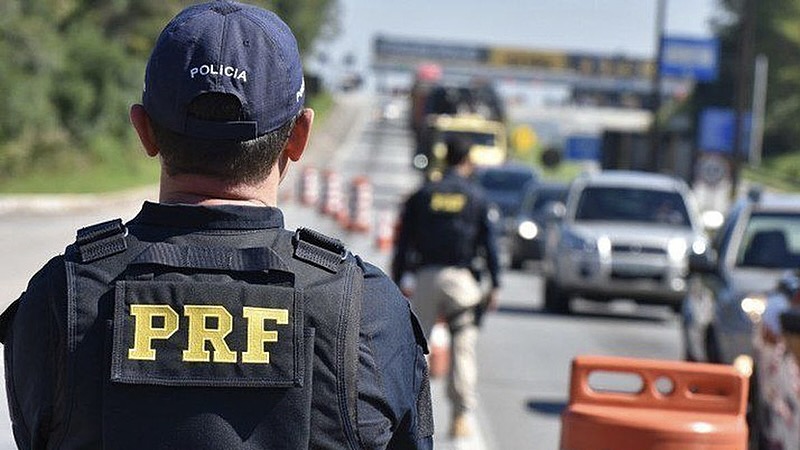The president of the Supreme Electoral Tribunal (TSE), Minister Alexandre de Moraes, ordered the Federal Highway Police (PRF) to urgently explain their operations that have prevented the movement of voters in different parts of Brazil’s Northeast this Sunday during the second round of voting in the elections.
The TSE’s response comes in response to a request made by federal deputy Paulo Teixeira of the Workers’ Party representing São Paulo, who said that the PRF and the Federal Police (PF) are being used to interfere in the electoral process. Reports say that as many as 500 checkpoints have been set up.
The day before the vote, the general director of the PRF, Silvinei Marques, posted an image on social networks in which he asked people to vote for Jair Bolsonaro (PL). On the same day, a TSE decision had ordered the suspension of operations this Sunday.
In the order, Moraes said that Marques can be held criminally liable for disobedience and electoral crime. The minister pointed out that “these are serious facts that justify the rapid action and adoption of appropriate measures in order to preserve the freedom of the right to vote.
In the request to the Court, the deputy Teixeira specifically cited a complaint of an episode registered in the city of Cuité, Paraiba. According to the complaint, a PRF checkpoint was scaring away the population of the rural area of the city who were on their way to vote.
A PRF está fazendo Blitz na entrada de Cuité, Paraíba. Um absurdo enorme!! Já está afugentando a população da zona rural!! Alguém precisa fazer alguma coisa!! O povo não vem votar! @TSEjusbr pic.twitter.com/JwgrPGaynq
— Hígor Lins ✠ (@higorlins3) October 30, 2022
The mayor of Cuité, Charles Camaraense of the Citizenship party, reiterated the complaint. On social media, he expressed indignation at the operation conducted by the PRF in the city. “If they think that this way they will inhibit the people from voting for Lula, they are mistaken,” he said in a post.
🚨 Grave: Charles Sílvia, prefeito de Cuité (Paraíba), denuncia blitz da PRF na entrada de sua cidade com o objetivo de impedir o exercício do direito de voto hoje (cc @TSEjusbr @alexandre) pic.twitter.com/8KSgmVdkNx
— Jeff Nascimento (@jnascim) October 30, 2022
Voters and political leaders made similar complaints in other cities. Senator Humberto Costa of the PT in Pernambuco received and shared some of the complaints.
Em Garanhuns, terra natal de Lula, agentes da PRF também estão proibindo as pessoas de votar. pic.twitter.com/Ad0LkNvzFd
— Humberto Costa (@senadorhumberto) October 30, 2022
Senator-elect and former governor of Maranhão Flávio Dino (PSB) said that there were police checkpoints and vehicles were being seized in the rural area of the city of Caxias, Maranhão. The complaint was taken to the Electoral Justice.
Recebi agora denúncia de blitz e apreensão de motos na zona rural de Caxias, efetuada pela Polícia Rodoviária Federal. Estamos fazendo a representação à Justiça Eleitoral para que apure a legalidade da operação policial >> pic.twitter.com/iWWyZHrXqA
— Flávio Dino 13 🇧🇷 (@FlavioDino) October 30, 2022
In some cases, those who raised complaints said that stickers from the campaign of Luiz Inácio Lula da Silva (PT) were removed from vehicles.
Isso realmente está acontecendo diante dos nossos olhos, essa é a liberdade que o Bolsonaro fala?
Polícia Rodoviária Federal
DEIXEM O NORDESTE VOTAR
Faz alguma coisa
Mesária pic.twitter.com/ySmzTMZf37— #LulaPresidente13 (@BiCarbonattoo) October 30, 2022
There were also complaints in other states such as Rio Grande do Norte.
Atenção @TSEjusbr @gleisi a PRF está realizando operação na minha cidade, neste momento. Parando os carros que veem da zona rural com eleitores. @felipeneto pic.twitter.com/XK9VdvO5xF
— Cinthia Meire (@cinthiameire) October 30, 2022
PT responds
The Workers’ Party (PT) filed a request for the arrest of the director general of the Federal Highway Police and Regional Superintendents for failing to comply with the decision of the Supreme Electoral Court (TSE) that prohibits the police from setting checkpoints or any operation that would hinder the transit of voters. The director-general of the PRF sent a circular letter, this S October 30, stating that he would not comply with the Court’s guidance.
Vasques had argued in the document that the TSE “was hasty” by prohibiting road operations and that the decision would have the “scope to change the distribution of powers” of the institutions.
After the publication of a series of videos denouncing irregular operations by the Highway Police, mostly in cities of the Northeast, the general director of the PRF, Silvinei Vasques, also published a video declaring his vote for Bolsonaro.
ATENÇÃO-pedimos a prisão do Diretor Geral da PRF e dos Superintendentes Regionais q ñ estão cumprindo a decisão do TSE. Peço aos parlamentares da nossa coligação q se dirijam aos locais das operações em seus estados e deem ordem de prisão aos policiais,inclusive PMs como no RJ
— Gleisi Hoffmann (@gleisi) October 30, 2022
“I ask the members of our coalition to go to the sites of the operations in their states and order the arrest of the police officers, including Military Police officers like in Rio de Janeiro,” said Gleisi Hoffmann, the president of the PT.
In the first round of elections on October 2, the Northeast, where the majority of the PRF operations are taking place, was the region with the highest level of support for the PT candidate. Lula won the region composed of the States of Alagoas, Bahia, Ceará, Maranhão, Paraíba, Pernambuco, Piauí, and Rio Grande do Norte, by 66.7% compared to Bolsonaro’s 27%. In the State of Piauí, Lula won an overwhelming 74.3% of the votes.
This piece is based on articles published in Portuguese on Brasil de Fato.





